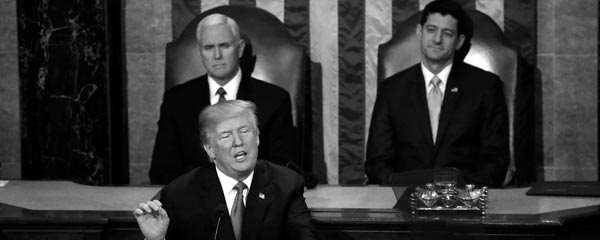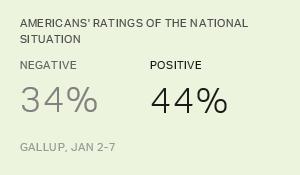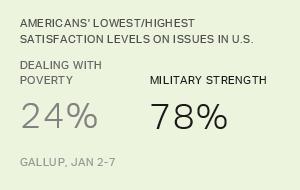President Donald Trump touched on a wide variety of themes, issues and proposals in his State of the Union address Tuesday night. My colleagues and I reviewed eight of these themes in the context of public opinion. Four of these issues, in particular, I believe, are ones about which the American public needs significantly more explanation and rationale.
The president in his speech called for increased spending on the military: For this reason, I am asking Congress to end the dangerous defense sequester and fully fund our great military. This is a request with highly significant implications, given that the military budget (including all defense-related activities) is over $600 billion and constitutes about 16% of all federal money spent.
The proposal to spend more on the military has a somewhat mixed public opinion context. Americans certainly like the military, as evidenced by the ovations during the speech when Trump recognized members of the military who had performed heroic acts. Most notably, Americans have more confidence in the military than in any other major societal institution we routinely test. Americans give "military officers" one of the highest honesty and ethics ratings of any profession in our annual update. And Americans have become even more satisfied over the past with the strength and preparedness of the U.S. military.
But -- maybe because of this positive view of the job the military is doing -- Americans are not convinced that more money needs to be spent on the military. Last year when we asked about the strength of the U.S. military, 45% of Americans said that the military is not strong enough, but about as many (43%) said that U.S. military strength is currently about right. And, directly to the point, well less than half of Americans -- 37% -- said that the U.S. is spending too little on the military, while the rest either said that military spending is about right or too much.
There is certainly a case to be made about the need to spend more on defense (witness the recent of two U.S. Navy destroyers off the coast of Japan that resulted in the deaths of 17 sailors), but one sentence devoted to this idea in the speech may not be enough. The majority of the public is not, at this point, on board with increasing defense spending and is going to need more explanation and discussion of exactly why more needs to be spent on defense, how it will be spent and what the benefits of the spending will be.
Trump in his speech was certainly proud of the tax bill passed by Congress and signed into law before the end of last year: And just as I promised the American people from this podium 11 months ago, we enacted the biggest tax cuts and reforms in American history. Our massive tax cuts provide tremendous relief for the middle class and small businesses. To lower tax rates for hardworking Americans, we nearly doubled the standard deduction for everyone. Now, the first $24,000 earned by a married couple is completely tax-free. We also doubled the child tax credit. A typical family of four making $75,000 will see their tax bill reduced by $2,000 -- slashing their tax bill in half.
Although Trump clearly thinks the bill will accrue to the great benefit of all Americans, he has to face the reality that Americans, at this point, don't see the new law in this type of highly positive light. Clearly more explanation is needed if the public is going to end up sharing Trump's positivity.
All polling with which I am familiar shows that well less than a majority of Americans approve of the tax bill. Â鶹´«Ã½AV asked about it in December, before it was passed, and re-asked in January after its passage, and in both instances found majority disapproval. Part of this most likely reflects the apparent view that Americans perceive the law will benefit corporations and the rich, but not necessarily themselves. The context, from our long trends on public opinion and taxes, is that Americans have historically thought that corporations and upper-income Americans pay too little in taxes, not too much.
It may be, as Trump and the Republicans argue, that the "tincture of time" will increase support for the bill. Paychecks are already beginning to reflect higher take-home pay as deductions for federal income taxes are lowered. This type of tangible evidence of the impact of the bill, along with a continuation of high stock market values and low unemployment, could certainly soften negative reaction to the plan. In fact, a recent Monmouth University shows support for the tax bill higher than previous polling, suggesting that maybe attitudes are already beginning to change.
But overall, Trump's (and his fellow Republicans') conviction that the tax bill is a great boon to the nation and its citizens is far from universally accepted by average Americans.
Trump's most ambitious proposal in the speech, at least in terms of dollar amounts, dealt with the nation's infrastructure: As we rebuild our industries, it is also time to rebuild our crumbling infrastructure. … I am asking both parties to come together to give us the safe, fast, reliable and modern infrastructure our economy needs and our people deserve. … Tonight, I am calling on Congress to produce a bill that generates at least $1.5 trillion for the new infrastructure investment we need.
Trump's call for a $1.5 trillion infrastructure bill is one of the most popular policy actions any politician can propose at this point. Two separate Â鶹´«Ã½AV polls conducted over the last couple of years show that three-quarters of the public supports more federal spending on infrastructure, and other polls since have reinforced this very positive reaction to the idea.
There are, however, needs for further explanation. First, why hasn't something been done about infrastructure so far? Both Trump and his opponent, Hillary Clinton, favored massive investments in infrastructure in their 2016 presidential campaigns, with Trump's disparaging comments about New York's LaGuardia Airport a centerpiece of his campaign rhetoric. The public needs an explanation of why one of the most popular proposals on the policy table has not yet come anywhere close to fruition.
Second, the public will need an explanation of how massive new spending on infrastructure is going to be paid for, keeping in mind that just straight-out spending federal money on infrastructure seems to be OK with Americans. One of our two questions about infrastructure included reference to the "federal government" paying for the infrastructure, and another specifically mentioned the figure 1 trillion dollars. Both were overwhelmingly approved. So the public seems happy to have the money come directly from the federal treasury (although the data were collected before the tax bill was approved), and happy even if the amount is at the trillion-dollar level. But news reports suggest that Trump is going to propose a bill that involves heavy investment by state and local governments, not just federal money. And, with the passage of the huge tax bill, discussions of exactly where any federal money to pay for infrastructure is going to come from move front and center. All of this demands an explanation for the public.
Finally, Trump's speech included a remarkable call for bipartisanship, compromise, common ground and unity: But it is not enough to come together only in times of tragedy. Tonight, I call upon all of us to set aside our differences, to seek out common ground and to summon the unity we need to deliver for the people we were elected to serve.
This is a noble sentiment, and one that -- as I have discussed in some detail -- fits very well with the thoughts of the American public. A good deal of data show that Americans want their leaders to compromise to get things done and dislike the rancor and bickering that currently typifies Washington.
It is also clear that the nation is decidedly not unified at this point, particularly in support of the administration and Congress. Trump, in a recent speech to Republican leaders in West Virginia, quoted Speaker of the House Paul Ryan, saying that he "has never, ever seen the Republican Party so united." That may be the case, but beyond base Republicans, there is little sign of unity. Trump's job approval rating remains below 40%, and approval of the job being done by Congress is well below that at 20%.
Plus, our research shows that political polarization (or disunity by another name) is so rampant that it continues to dramatically affect the way people look at the economy and many other social and policy issues facing the nation.
Trump, who tends to approach the world as a win-lose proposition, is not noted for his unifying statements and actions. The explanation the public needs here is exactly how polarizing and reaction-generating politicians are going to help seek the common ground and the unity Trump called for.




